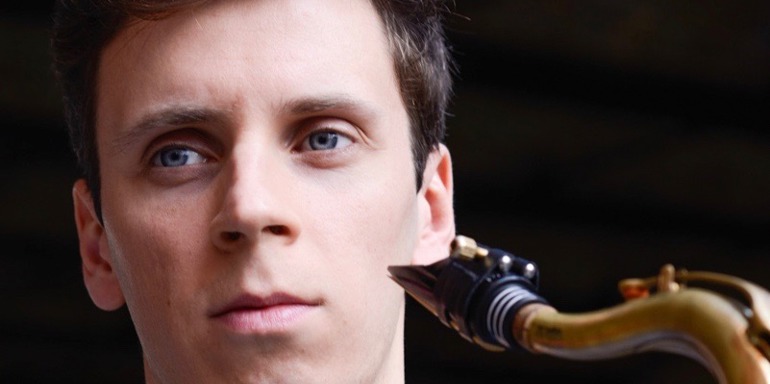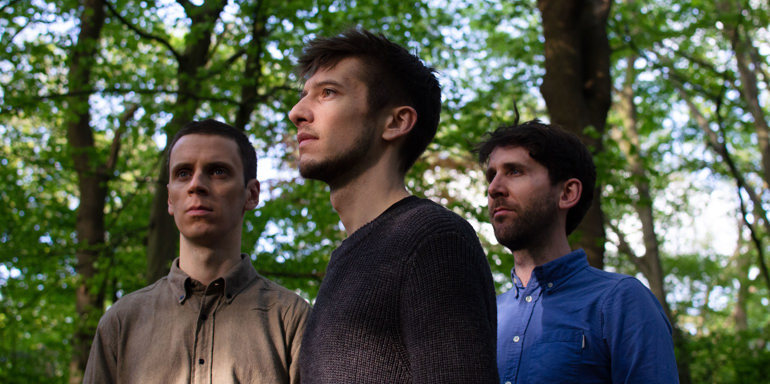
Course Studied: BA Jazz
Year of Graduation: 2013
Top Career Highlights:
- Performing live on BBC Radio 3 with Nick Smart, Kit Downes, Tom Herbert and Martin France, alongside other students from The Royal Academy of Music in 2017
- Completing a 10 month weekly residency from 2016-17 at The Jazz Café alongside Ashley Henry (Sony Music)
- Performing as part of his own project at the Royal Albert Hall ‘Elgar Room’ as part of the Proms Plus Late Sessions, which was later broadcast on BBC Radio 3, in 2013
- Touring the UK in 2013 with the same band, playing at prestigious venues on the jazz circuit.
ROBIN PORTER is an award-winning saxophonist, composer and educator based in London. He is a versatile and accomplished musician, having performed at many prestigious venues across the UK. Robin regularly works as a bandleader and sideman alongside some of London’s most talented young musicians/bands. His own current projects include ‘Aspyrian’ (jazz/folk traditions meet rock & electronics) and ‘The Porter Quartet’ (classic quartet inspired by the jazz greats).
Robin received a distinction upon completing the MA Jazz Performance course at The Royal Academy of Music (RAM), where he had the privilege of studying with world-class performers/educators. He is a graduate of the Leeds Conservatoire BA Jazz programme with first class honours and was awarded ‘The George Murphy Trophy for Jazz Saxophone’.
Robin is passionate about music education. He has taught 1:1 lessons in woodwinds, music theory, composition and musicianship at numerous institutions for many years. He is also an experienced workshop leader and is an ensemble tutor for the National Youth Jazz Collective (NYJC).
Where did your musical journey begin?
I grew up in Southend and started playing the recorder and clarinet with a friend at primary school. His family ran the church band, so we would play in that group every Sunday. I also went to a music centre every Saturday morning for 1:1 lessons and would participate in ensembles and musicianship/theory classes too.
I was fortunate to attend a secondary school that had a fantastic music department and inspiring teachers (both classroom and peripatetic). My aspiration for playing saxophone came from hearing the school big band, and although I kept working on my classical clarinet playing (through the ABRSM grades), I quickly became more passionate about jazz – both the style and improvising in general.
At the time, I was only a little aware of the opportunities outside of school for learning jazz (probably because my school ran such an extensive extra-curricular programme) – looking back, it would have been a good idea to have got involved with more of this to open my eyes to the standard of some young players. If you’re considering pursuing music as a degree or profession, I would recommend participating in some regional/national ensembles and summer schools as soon as you feel able.
As I got a little more experienced, I did start to go to jams and play with some local professional musicians which were mostly organised by Zak Barrett (saxophone) and Dan Banks (piano) who were teaching me at the time. They really did a lot to support and prepare me musically for college, and I know Zak still does an enormous amount for the scene in Essex.
What inspired you to study Jazz at Leeds Conservatoire?
I was actually unsure about whether to study an academic music programme at university or a performance-based degree at a conservatoire. I like a broad range of music and am also interested in a broad range of disciplines within music (performing, but also composing and music technology). The thought of specialising in jazz performance was quite daunting especially as I had come to it relatively late in my musical journey.
To be honest, I made the decision on a bit of a whim – I realised that I wanted to spend most of my time playing and creating music rather than writing essays about it. Leeds Conservatoire was in fact great at accommodating students with different musical interests and I think this is something it still does well.
What did you enjoy about the music scene in Leeds?
Leeds has a great music scene. There was really good music happening most nights when I was a student – from jazz gigs/jams at Cellar Bar and HEART to funk/soul at HiFi Club. And then nationally and internationally renowned jazz artists at Seven Arts. I’m not sure if all these gigs are still happening, but I know there are brilliant musicians living in Leeds who put a lot of energy into helping the scene thrive.
I also felt like the scene was really supportive for up-and-coming musicians. There were many opportunities to perform, with some promoters carving out regular slots in their programme for students or recent graduates.
I continued to live in the city for a couple of years after I finished college – at this stage in particular, it’s important to have other people around who are also practising in order to stay inspired. There was and continues to be no end to fantastic musicians who are constantly working on their craft in Leeds.
What is a stand-out moment from your time at Leeds Conservatoire?
There was a big band project with Iain Dixon and Mike Walker that was amazing. They are both somewhat ‘hidden gems’ of the UK jazz scene, but any musician who has encountered them holds them in the highest regard. I went on to have lessons with Iain a little after college too. He really inspired me to study hard!
Perhaps most importantly though, I had brilliant colleagues in my year at Leeds Conservatoire, some of whom I still work with on a regular basis and are my closest friends. I felt that there was a lot of people who were much more advanced musically, but everyone was super encouraging and up for playing.
Can you tell us a little bit about your work since leaving Leeds Conservatoire?
Gigs, practice, and teaching. It’s a bit of a cliché to say as a musician, but my life has really revolved around these occupations for the past ten years.
Of course, there has been a lot a variety within these endeavors. Most of my performing work has been for functions (background jazz and party bands), but I’m starting to do more creative jazz gigs on a regular basis. As a jazz musician, I feel that there is a pressure from early on in your career to be exceptionally proficient on your instrument and to compose or release original music. Whilst I have these ambitions (and have had some fairly intense periods of trying to develop musically), I think it’s equally important to nurture a healthy relationship with your instrument and music. I’m much more interested in building a long-term and fulfilling career rather than having a fleeting moment of fame (not that this has opportunity has arisen!)
I’ve always been passionate about music education, and I’ve been fortunate to consistently have a teaching position since I left college. Most of this has been 1:1 woodwind tuition in schools, but I’ve also led a lot of workshops in jazz and improvisation (including for the National Youth Jazz Collective). Whilst teaching children can be challenging and tiring, if you manage your expectations and see music lessons as a part of their whole school experience then it can be really fulfilling. Very few students will go on to be professional performers, and the majority will probably not practice much, but for that 30-minute session once a week you can really help them understanding something about learning, creativity and discipline (as well as having fun!).
Having been working as a freelance musician now for about 10 years, I’m now able to be a little more selective about the work I take on. Some great advice that was given to me is that there are three reasons for accepting a gig. 1. It’s musically stimulating; 2. You make new/good contacts; 3. It’s good money. If it ticks more than one of these boxes, then you’re doing well. The point is that it’s good to know your worth as a musician, and don’t feel the need to say yes to everything. Whilst you can learn something from most situations, sometimes saying no and having time for yourself is more valuable.

Tell us about your trio, Aspyrian. How did you meet and what’s your music style?
Aspyrian is a London-based trio featuring myself on saxophones, Matt Parkinson on drums and Jack Gillen on guitar. We met over 10 years ago whilst studying at Leeds Conservatoire and have played in various contexts together, but we did not form this band until 2020 – I guess the pandemic provided us all with an opportunity to reflect on what we wanted to do creatively.
The band takes inspiration from numerous ‘bass-less’ trios in the jazz idiom – the most obvious reference point being Paul Motion’s trio, but also current artists such as Will Vinson, and (much) closer to home ‘Glasshopper’ (led by another Leeds Conservatoire alumni Jonathan Chung). These jazz influences are blended with an array of folk music traditions (for example Matt has spent a lot of time studying music from Brazil and Cuba) as well as an eclectic mix of soulful songwriters and alternative bands.
The instrumentation means that there is a lot of space in the texture (although less than you might expect owing to the effects pedals used by Jack and myself), and this has taken a while to get used to. The bass is often the centre of gravity in many styles of music, so whilst it can be very freeing without this frequency, it’s also musically challenging.
Matt and I write the compositions individually, but we all contribute ideas during rehearsals. The process for writing music in the initial stages for this band is generally the same as if I was writing for anything else – the difference comes when it’s being arranged (both in terms of texture and structure), and a lot of this work is done collaboratively during rehearsals. It can be a challenge deciding which part should be covered by which instrument, and sometimes realising what can be left out. But this limitation forces you to be succinct and realise what the most important ideas are. Crucially it often comes down to making sure there’s both a good shape and contrast (in terms of energy) to each composition, as well as to the overall set.
Aspyrian have recently been awarded the Help Musicians Record/Release Fund which will support recording costs for your debut album. Congratulations! What does receiving this award mean to you? What will it allow you to do?
Thank you! This award means a lot for Aspyrian. Not only does it allow us to properly invest in every aspect of the recording/release process, but also gives the album the gravitas to attract the attention of our audience and promoters. This grant comes at a critical point in the group’s evolution, where we find ourselves with well-rehearsed original music and enough shared experience and contacts to produce an exceptional debut album.
We are hoping that it’s release will create a cycle of exposure, performances, revenue, and the reinvestment into future releases. The initial injection of financial support is essential for us to begin this process in a convincing manner.
Help Musicians have already played an important part in the development of our band; Matt and I were supported by this charity whilst studying on the Royal Academy of Music Postgraduate Course. We feel very privileged that they are continuing to help us pursue our creative output, and we hope our audience enjoys the end result as much as we are enjoying the process!
The album is set to be released in early 2023. Please follow our socials/sign up to the mailing list to stay in the loop.







